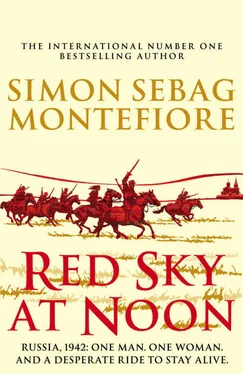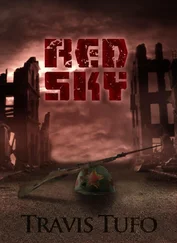An adjutant was whispering something in the great man’s ear.
‘Golden, you’re drifting away. Listen to me. If you are allowed to reside in Moscow, what would you like to do?’
‘Teach literature.’
‘At a school?’
‘Yes. And if it isn’t possible, I’ll do anything, sweep floors, build tanks, or become a barman or…’
‘Your chatter gets you into trouble. Stop talking, Golden.’
Satinov stood up. He didn’t say goodbye, just a slight dip of the head. But this was extraordinary: no one helped returning Zeks and yet here was Satinov doing exactly that. Benya felt hopeful again. Satinov’s entourage of doctors, adjutants and bodyguards reassembled and escorted him into the next ward.
A shadow fell over him and Benya looked up.
‘Granpa!’
Benya jumped. Two men, tamed by their standard-issue hospital blouses and fraying long johns, were standing next to the bed.
‘You should go back to your ward,’ said the nursing sister, a battleaxe with the face of a puff adder. ‘Go on, I say! Or I’ll report you to the Party committee.’
‘Right, sister, one minute… please!’
Benya could see there was something about the way Prishchepa said it, the pirate’s smile he gave, the tousle of his flaxen thatch, that made her melt.
‘One minute, then, Speedy, and not a minute more!’
‘You see? She even knows my name,’ said Prishchepa, who had a dressing on his shoulder.
‘Behave yourself, Speedy,’ she said sternly as she waddled out.
Prishchepa sat himself on the edge of the bed. ‘Who was that bigshot?’ he asked.
‘Some apparatchik.’
‘What’s he want? Appointing you Inspector of Cavalry?’ Panka had appeared, his face and chest sunburnt, his grey hair longer, the whiskers shaggier. He leant on crutches, a cast on his shattered leg.
‘Nothing. Maybe less than nothing.’
‘I think Granpa Golden would be better as Inspector of Marksmen,’ said Prishchepa with a wink.
Benya sighed. ‘I was never much of a rider and I wasn’t much better as a shot.’
‘Don’t do yourself down,’ replied Panka, his tiny foxy eyes bright. ‘You turned out to be a better shot than you thought. God bless you, boy.’
What kind of topsy-turvy world was it where you could only save the lives of your friends by shooting them? Benya thought. But Stalin’s decree was specific: Shtrafniki could only be redeemed by sacrificing their own blood and so Benya had given his friends the wounds they needed to win redemption.
Perhaps it was the relief of knowing that Satinov had secured his redemption or perhaps it was just the morphine wearing off a little – he needed some more; where was that nurse? – but quite suddenly he felt a jolt of stunning grief and he was choking. The sadness rocked him, the sense of loss pounding through him: Fabiana was dead. He pictured her dipping her hand into the honeycomb, scooping it out and eating it like a bear. Love, he thought, is all about the details – a dictionary of visions, moments, sounds that have no names, no words necessary. Love is always selfishness at its most delicious – but with Fabiana, there was no time for selfishness. Sometimes the very shortness of an affair, he decided, grants it an immaculate purity that passes directly into legend – and nothing afterwards can ever equal it. But their mere hours together were lived in a rougher, higher realm; they never said ‘I love you’ to each other; they were just the ‘bandits in love’, and that said it all. From the start, they were galloping, fleeing, fighting to escape death and, ultimately, to survive each other – and the miracle was that they had managed that, at least for a while. Should he have told her that he loved her? Would that have comforted her? Such trifles would have been somehow futile and irrelevant beside the immensity of the courageous sacrifices she made for him. ‘Are you out there somewhere, darling ally, brave, brave friend?’ he called to her quietly. ‘Are you there, secret dreamer of the lagoon, mia adorata ? I kiss you! I kiss you!’
I knew her once, he thought, aware that tears were running down his cheeks. I knew her somehow forever. But for us, forever was too short.
Poskrebyshev, a drear gnome in a general’s uniform, stood at the door of the Little Corner. ‘Satinov’s here,’ he announced.
Stalin beckoned, and Poskrebyshev stepped aside and Satinov entered.
Satinov’s Packard had raced from the hospital to the Kremlin and then round to the Little Corner in the triangular yellow Senate. He did try to visit the wounded from the Stalingrad Front when he could but he acknowledged to himself that this visit had been connected to Benya Golden. He had played a role in the Sashenka Case against Benya Golden and now he wanted to ensure he was treated justly. But he had not had the heart to tell him a terrible truth: his redemption was not final. There were millions of prisoners in the Camps whose names Stalin had never seen – but they were not Politicals; nor were they Politicals convicted in cases known personally to Stalin. If he, Satinov, concealed the pardoning of a Political, a writer known to Stalin, the Leader could destroy him with it. He had seen comrades shot for just such a legerdemain. No, he must ask Stalin directly, although it was likely Beria would advise against it. Beria was not just the master of the security forces and the Gulags but he was also jealous and wary of Stalin’s affection for Satinov, which was why he had not wasted much time on poor Benya Golden who would probably be heading straight back to Kolyma.
Satinov entered the room and saluted. Little seemed to have changed. Beria was back at the table. Further down, Vasilevsky had been joined by General Georgi Zhukov, with his prehensile jaw and tauric shoulders.
‘Permission to report from the Stalingrad Front,’ said Satinov.
Stalin raised his hand in approval.
‘We are fortifying Stalingrad. The Germans are reinforcing Army Group B and the Sixth Army specifically. We hear from the Southern Front that they are even now, as of this morning, moving panzer units out of the front line, probably for transfer to our sector. They’re already racing across the steppe.’
‘How close are they to the city?’
‘Units have already reached the outskirts,’ replied Vasilevsky.
‘How are the generals on your front?’
‘Chuikov’s bunker is right by the river and he will fight to the last. He’s a tough one. I commend his harshness, Comrade Stalin, but Gordov lacks resolve,’ Satinov continued.
‘Gordov regularly talks aloud of abandoning Stalingrad,’ piped up Beria.
Stalin cast cold eyes at Satinov. ‘True?’
‘He lacks confidence.’
‘But will Stalingrad hold? Will we be able to cling on to the Volga no matter what?’ asked Stalin. ‘Tell me honestly as one Bolshevik to another.’
Everyone looked at him and waited. Satinov did not rush to answer but considered the honest answer which an old Bolshevik expected from a comrade.
‘Yes,’ said Satinov finally. ‘I know we will hold Stalingrad.’
‘Good, bicho ,’ said Stalin. ‘Tell him to fuck off and punch him in the gob if he says it again.’
‘Or give him to me,’ added Beria.
‘We’ll let Satinov deal with Gordov first,’ answered Stalin, standing up and walking towards the generals, who were leaning over the maps.
Vasilevsky and Zhukov straightened up and stiffened as Stalin approached.
‘We have ourselves the battle we wanted,’ he said. ‘Hitler has taken the bait but it will cost us much blood to hold the city. We must draw in the Germans without destroying ourselves. The only people in Russia who know of this are in this room. After many reverses, the golden hour is here. Good luck,’ and he offered his hand first to Vasilevsky and then Zhukov. Satinov and Beria glanced at each other, unsure what exactly the Leader had cooked up with the two generals. Stalin had never shaken hands with anyone like this. ‘Make your preparations, comrades,’ he said as the two generals saluted and left.
Читать дальше












